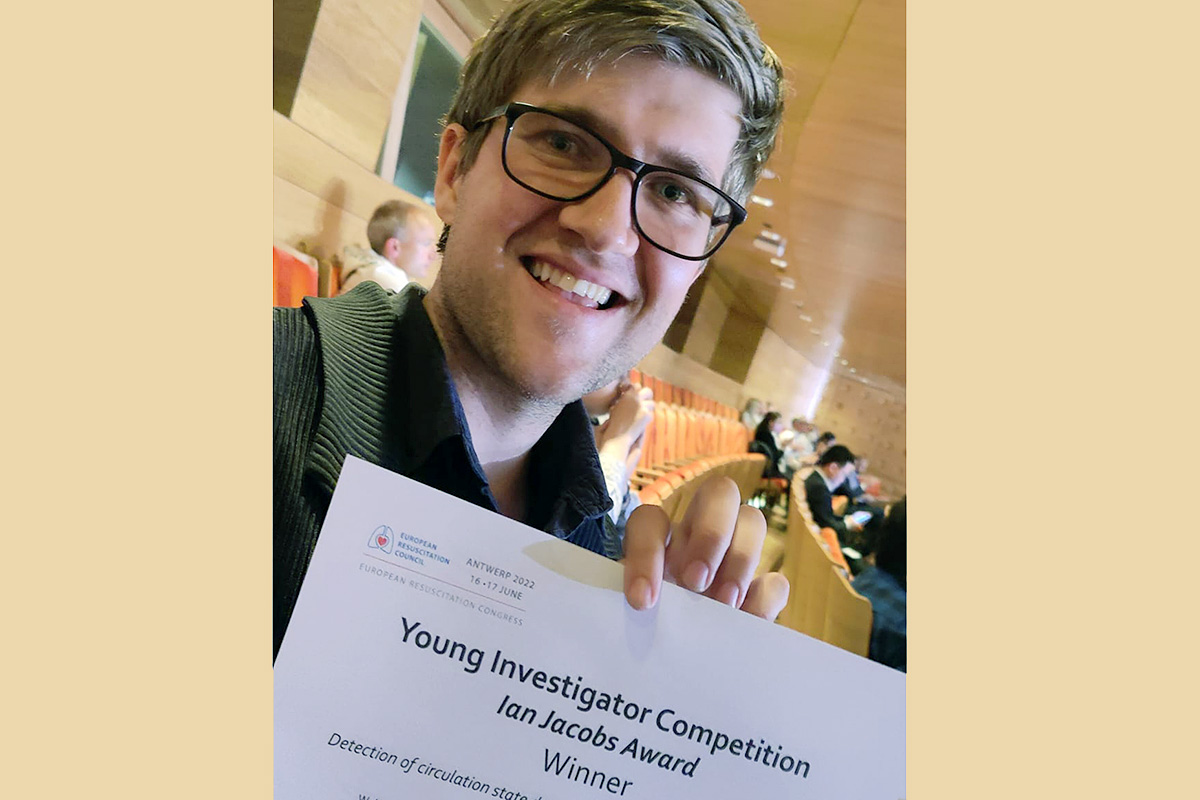Mit Herzdruckmassage und Defibrillation können viele Menschen gerettet werden, die einen unerwarteten Kreislaufstillstand erlitten haben. Dabei ist es für NotärztInnen eine große Herausforderung zu erkennen, ob das Herz wieder zu schlagen begonnen hat. Denn das ist in einer solchen Situation im EKG nicht ersichtlich. Und auch händisch lässt sich der Puls häufig nicht sicher ertasten. Eine Gruppe Grazer Wissenschafter hat in Kooperation mit Ärzten vom Institut für Rettungs- und Notfallmedizin der Universitätsklinik Schleswig-Holstein in Kiel und dem deutschen Reanimationsregister einen Algorithmus entwickelt, der den Herzschlag erkennt. Er kann bei der Erstversorgung von PatientInnen helfen, schnell die richtigen Entscheidungen zu treffen. Für ihre Arbeit wurden die Forscher vom Europäischen Rat für Wiederbelebung mit dem Ian Jacobs Award ausgezeichnet.
Viele Defibrillatoren verfügen über einen Beschleunigungssensor, der als Hilfestellung bei der Wiederbelebung Rückmeldung über Drucktiefe und -Frequenz der Herzdruckmassage gibt. Dieser Sensor kann beim schlagenden Herz auch das Anstoßen der Herzspitze an die vordere Brustwand registrieren. „Unser Algorithmus, den wir mit Machine-Learning-Methoden trainiert haben, verwendet die biomedizinischen Signale des EKG und des Beschleunigungssensors, die während der Reanimation aufgezeichnet werden, um festzustellen, ob das Herz wieder schlägt“, erklärt Wolfgang Kern vom Institut für Mathematik und Wissenschaftliches Rechnen der Universität Graz. „Damit liefert er ÄrztInnen neben EKG und händischer Pulsmessung eine weitere Information, um rasch Entscheidungen zu treffen und die geeigneten lebensrettenden Maßnahmen zu setzen“, unterstreicht Simon Orlob von der Medizinischen Universität Graz die Bedeutung der Entwicklung.
Ein zusätzlicher Pluspunkt: „Der Algorithmus benötigt nur Daten, die bereits ohnehin von vielen Defibrillatoren aufgezeichnet werden“, erklärt Martin Holler, Leiter der Forschungsgruppe „Mathematics of Data Science“ an der Universität Graz. Für die Anwendung muss also im Prinzip nur die Software des Defibrillators upgedatet werden. Nachdem die Wissenschafter zeigen konnten, dass das Konzept funktioniert, sollen nun weitere Studien zur klinischen Umsetzung folgen.
Ian Jacobs Award
Auf der diesjährigen Konferenz des Europäischen Rats für Wiederbelebung – European Resuscitation Council (ERC) – im Juni in Antwerpen erhielten die Forscher für ihren Konferenzbeitrag „Detection of circulation state during cardiac arrest treatment employing accelerometry“ den Ian Jacobs Award. Der nach dem australischen Wissenschafter, Arzt und Pionier der Reanimation benannte Preis zeichnet herausragende Arbeiten junger ForscherInnen aus.
Publikationen
Detection of circulation state during cardiac arrest treatment employing accelerometry
Wolfgang Kern, Simon Orlob, Andreas Bohn, Wolfgang Toller, Jan-Thorsten Gräsner, Jan Wnent und Martin Holler
Resuscitation 175, S5. DOI: 10.1016/S0300-9572(22)00378-1
Preprint:
Accelerometry-based classification of circulatory states during out-of-hospital cardiac arrest
Wolfgang Kern, Simon Orlob, Andreas Bohn, Wolfgang Toller, Jan-Thorsten Gräsner, Jan Wnent und Martin Holler
arxiv.org/abs/2205.06540
